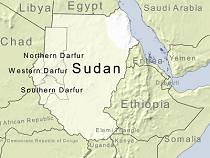2007年VOA标准英语-Clashes Erupt Among Sudanese Arabs(在线收听)
By Noel King
Kass, Darfur, Sudan
26 February 2007
The African Union has warned that violent clashes between nomadic Arab tribes are heating up in south Darfur. A series of recently attacks by the Reizegat tribe has paralyzed much of the region. Noel King reports for VOA from Kaas, south Darfur.
 |
| Map of Darfur region of Sudan |
They sing, "Oh, bird, I am not a sniper, don't fly away from me." Perhaps strange words for a song for small children, but even the youngest in Darfur have witnessed unspeakable violence during four years of conflict in the region.
Violent attacks by Arab nomads known as janjaweed have terrorized this land since 2003.
The Sudanese government is charged with arming Arab nomads to crush a rebellion by African farmers who rose against Khartoum's powerful Islamist regime for neglecting the remote Darfur region.
But now, the janjaweed are not only fighting the Africans, they are also warring among themselves.
In the latest such incident, the African Union protection force based in Kaas, south Darfur, was alerted Sunday to a massacre in the village of Amar Jadeed.
Elderly Hussein Ahmed Hassan arrived at the AU base and reported 32 villagers from the Arab Terjem tribe were killed in an attack by the Arab Reizegat tribe.
Hussein said women and children have fled the village. He said they reported the attack to the police but no action was taken. The camel men, he said, wore government uniforms and they are supported by the government.
AU peacekeepers drove 26 kilometers to the village, but arrived at the scene of the attack several hours after it happened. The village was in ashes, with small fires still smoldering. Twenty nine bodies were stacked in the bed of a truck for burial in a nearby cemetery.
Three young children had already been laid in the ground. Men sat astride camels preparing for another attack while women gathered in a group and wept.
The villagers are not the African farmers who are normally the victims of janjaweed militias. The Terjem are Arab camel herders themselves and local people tell VOA they were once friendly with the Reizegat.
Now, as the situation in Darfur grows increasingly desperate and water and food are even harder to find, the Reizagat and the Terjem have turned on one another.
The Terjem accuse the Sudanese government of providing arms to the Reizegat.
A day earlier, in Tutura village just north of here, four young Terjem boys were shot execution style by Reizegat in the back, as they slept.
On photographs of the victims obtained by VOA, the youngest boy appeared to be about seven years old, the eldest 15.
One boy's father, Abaker Fadil Isaac, spoke to VOA at the his son's funeral.
He said he heard the gunshots. He said his son was 15 and he slept along with the other boys. He said the men who killed the children came on camels.
The African Union has warned that the recent outbreak of tribal conflicts in south Darfur is ominous.
Bashar Osman, a Reizegat camel herder with a rifle strapped to his back, spoke to VOA near Gubba village south of Kaas.
Osman says the janjaweed are like storybook monsters. People are scared of them, he says, but no one has ever seen them.
Back at Amar Jadeed, African Union peacekeepers take notes for a report on the incident, but in the distance gunfire erupts again. The villagers, on their way to camps for the displaced in Kaas come fleeing back over the hills.
The African Union peacekeepers run for their patrol trucks. Their mandate forbids them from stepping in between fighting forces. They are allowed to raise arms only in self-defense.
They argue over whether to go back to the village, but decide against it. The people of Amar Jadeed are left to their own fate.